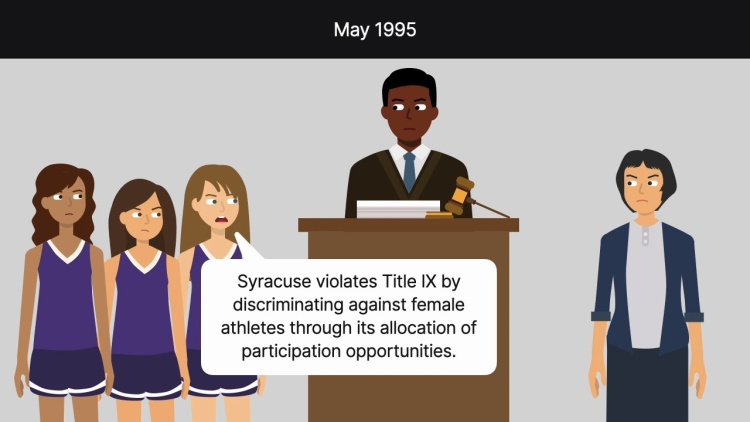Boucher v. Syracuse University
United States Court of Appeals for the Second Circuit
164 F.3d 113 (1999)

- Written by Eric Cervone, LLM
Facts
Female students, including Jennifer Boucher (plaintiffs), sued Syracuse University (defendant), alleging numerous violations of Title IX. The students argued that Syracuse discriminated against female athletes in its allocation of participation opportunities. The students specifically addressed the need for women’s varsity lacrosse and softball. At the time the suit was filed, Syracuse funded 11 men’s varsity teams and nine women’s varsity teams. Eventually, Syracuse announced that it would add two new women’s varsity teams, to bring the number of varsity teams funded by the school to 11 men’s and 11 women’s. Women’s lacrosse began playing prior to trial; at the time of trial, Syracuse had plans to implement women’s softball. Syracuse thus argued that the students’ complaint was moot. The trial court granted summary judgment to Syracuse on the student’s equal treatment claims. The trial court also granted summary judgment to Syracuse as to an issue about equality in club sports, though the students never brought a claim regarding club sports. The students appealed, arguing that the case was not moot because they sought to add a claim for damages. The students did not seek to amend their complaint to add the damages claim until three months after Syracuse filed its motion for summary judgment, and the students’ attorney failed to mention damages at oral argument. The students also argued that they were continuing to seek class certification for students interested in softball, as it was not yet a varsity sport. In their arguments, the students also contended that they were representing all women who might wish to be varsity athletes at Syracuse, regardless of sport. The case was appealed to the United States Court of Appeals for the Second Circuit.
Rule of Law
Issue
Holding and Reasoning (Calabresi, J.)
What to do next…
Here's why 907,000 law students have relied on our case briefs:
- Written by law professors and practitioners, not other law students. 47,100 briefs, keyed to 996 casebooks. Top-notch customer support.
- The right amount of information, includes the facts, issues, rule of law, holding and reasoning, and any concurrences and dissents.
- Access in your classes, works on your mobile and tablet. Massive library of related video lessons and high quality multiple-choice questions.
- Easy to use, uniform format for every case brief. Written in plain English, not in legalese. Our briefs summarize and simplify; they don’t just repeat the court’s language.





